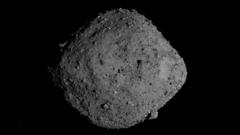Recent research from asteroid Bennu has unveiled a remarkable treasure trove of organic compounds, reshaping our understanding of life's origins. The asteroid, a 500-meter-wide mass of boulders and rubble, provided samples analyzed by scientists after a successful mission by NASA's Osiris Rex spacecraft brought back dusty grains in 2023.
Within this asteroid's dusty remnants lie vital components that form the foundation of life on Earth, including amino acids and nucleobases—elements crucial in the formation of proteins and DNA. While these findings do not imply that life ever existed on Bennu, they bolster the theory that asteroids were instrumental in delivering essential ingredients to our planet billions of years ago, fueling the biological processes that led to life.
Prof. Sara Russell from the Natural History Museum in London expressed her excitement over these discoveries, emphasizing the significant implications they hold for understanding the origin of life. "What we've learned from it is amazing. It enables us to answer these really, really big questions about where life began," she said.
The research, published in the journal Nature, reveals that the material collected—approximately 120 grams of black dust—was richer in nitrogen and carbon-rich compounds than previously anticipated. In fact, scientists identified 14 of the 20 amino acids necessary for protein synthesis and all four nucleobases required for DNA formation.
Moreover, the samples contained various minerals and salts indicative of past water presence on Bennu. The detection of ammonia in the analysis is particularly notable as it plays a key role in biochemical reactions. "It's just incredible how rich it is," says Prof. Russell, highlighting the novel minerals uncovered in the samples.
This research aligns with the prevailing hypothesis that asteroids bombarded early Earth, delivering both water and the organic materials that facilitated ocean formation and life. Dr. Ashley King from the Natural History Museum explained that while Earth remains the only known planet with life, the potential for discovering similar compounds on other celestial bodies is significant.
As researchers delve deeper into the samples' complexities, they aim to unravel the cosmic history that made Earth unique. The findings not only open new avenues for exploring how life originated on our planet but also ignite interest in the quest for life beyond Earth within our Solar System's expansive landscapes. With decades of research ahead, the dust from Bennu promises to continue unveiling secrets of our cosmic lineage.


















